Green renovation solutions are an excellent way to make your home more environmentally friendly while also enhancing its beauty and functionality. By integrating sustainable practices and materials, you can significantly reduce your carbon footprint and contribute to a healthier planet. Here’s how you can implement these solutions effectively.
Key Takeaways:
- Green renovation solutions involve sustainable practices and eco-friendly materials.
- These solutions can reduce energy consumption and contribute to a healthier environment.
- Key areas include energy efficiency, water conservation, and sustainable materials.
Understanding Green Renovation Solutions
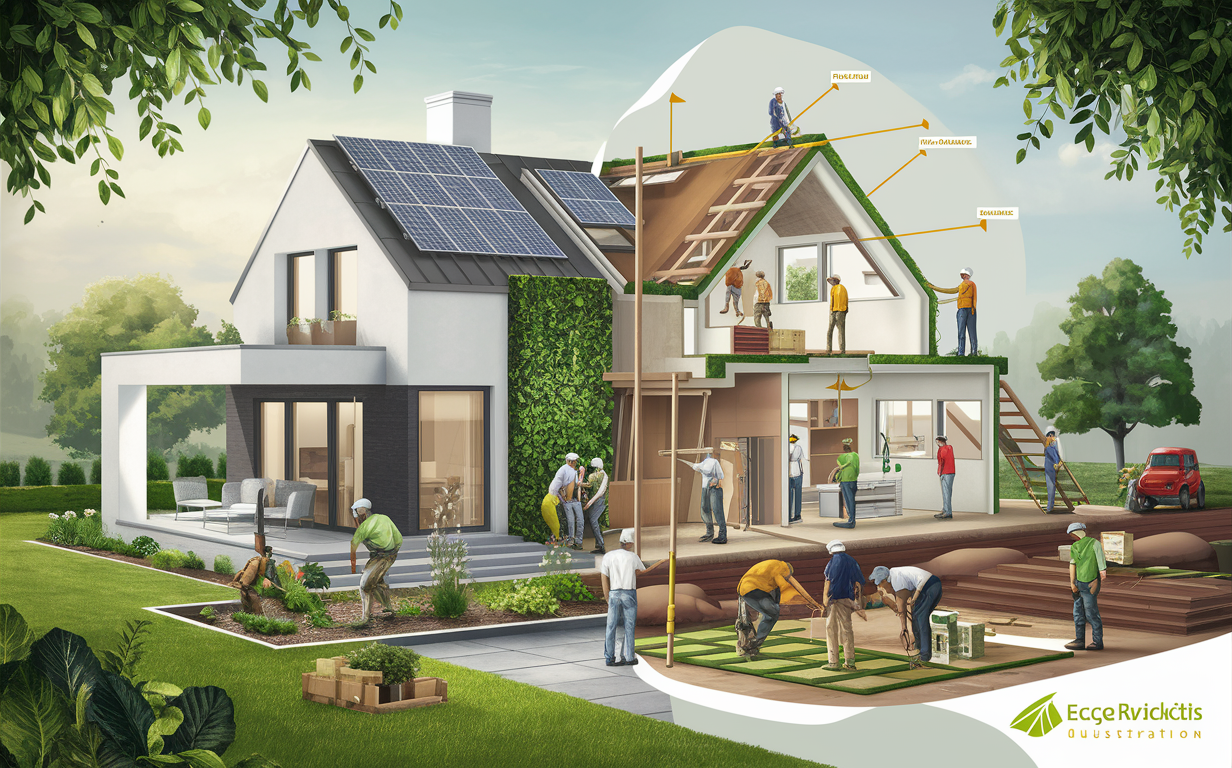 Green renovation solutions incorporate sustainable practices aimed at minimizing environmental impact. These solutions often focus on energy efficiency, water conservation, and using sustainable materials. Here’s how you can transform your home into a green oasis.
Green renovation solutions incorporate sustainable practices aimed at minimizing environmental impact. These solutions often focus on energy efficiency, water conservation, and using sustainable materials. Here’s how you can transform your home into a green oasis.
- Learn the Basics of Energy Efficiency from the U.S. Department of Energy
- Discover Energy Star, a U.S. Environmental Protection Agency Program
- Explore Energy Efficiency Verification and Certification
Energy-efficient renovations are the cornerstone of sustainable living. Reducing energy consumption not only lowers your utility bills but also decreases your home’s carbon footprint.
Insulation and Windows: Proper insulation and energy-efficient windows are crucial. They help maintain indoor temperatures, reducing the need for heating and cooling systems.
Solar Panels: Installing solar panels can significantly reduce your reliance on non-renewable energy sources. Solar energy is renewable and can power various home appliances.
Energy-Efficient Appliances: Opting for appliances with high energy ratings can greatly reduce energy consumption. Look for Energy Star-rated products that guarantee efficiency.
| Energy-Efficient Appliances | Annual Energy Savings | Cost Savings |
|---|---|---|
| Refrigerator | 15-20% | $20-30 |
| Washing Machine | 25-30% | $40-60 |
| Dishwasher | 10-15% | $10-20 |
| LED Lighting | 75-80% | $5-10 (per bulb) |
Water Conservation
Water conservation is another critical aspect of green renovations. Implementing water-saving fixtures and systems can greatly reduce water usage.
Low-Flow Fixtures: Installing low-flow toilets, faucets, and showerheads can reduce water consumption by up to 60%.
Rainwater Harvesting Systems: These systems collect and store rainwater for various household uses, such as irrigation and flushing toilets, reducing the demand for treated water.
Greywater Systems: Greywater systems recycle water from sinks, showers, and laundry for use in landscaping, minimizing the use of fresh water.
Sustainable Materials
Using sustainable materials is essential for eco-friendly renovations. These materials have a lower environmental impact and are often more durable.
Reclaimed Wood: Reclaimed wood is sourced from old buildings and structures. It reduces the need for new lumber and adds a unique aesthetic to your home.
Bamboo Flooring: Bamboo is a fast-growing, renewable resource that makes for an excellent flooring material. It’s durable and has a lower environmental impact than traditional hardwood.
Recycled Insulation: Insulation made from recycled materials, such as denim or newspaper, offers excellent thermal performance while reducing waste.
Real-Life Success Stories
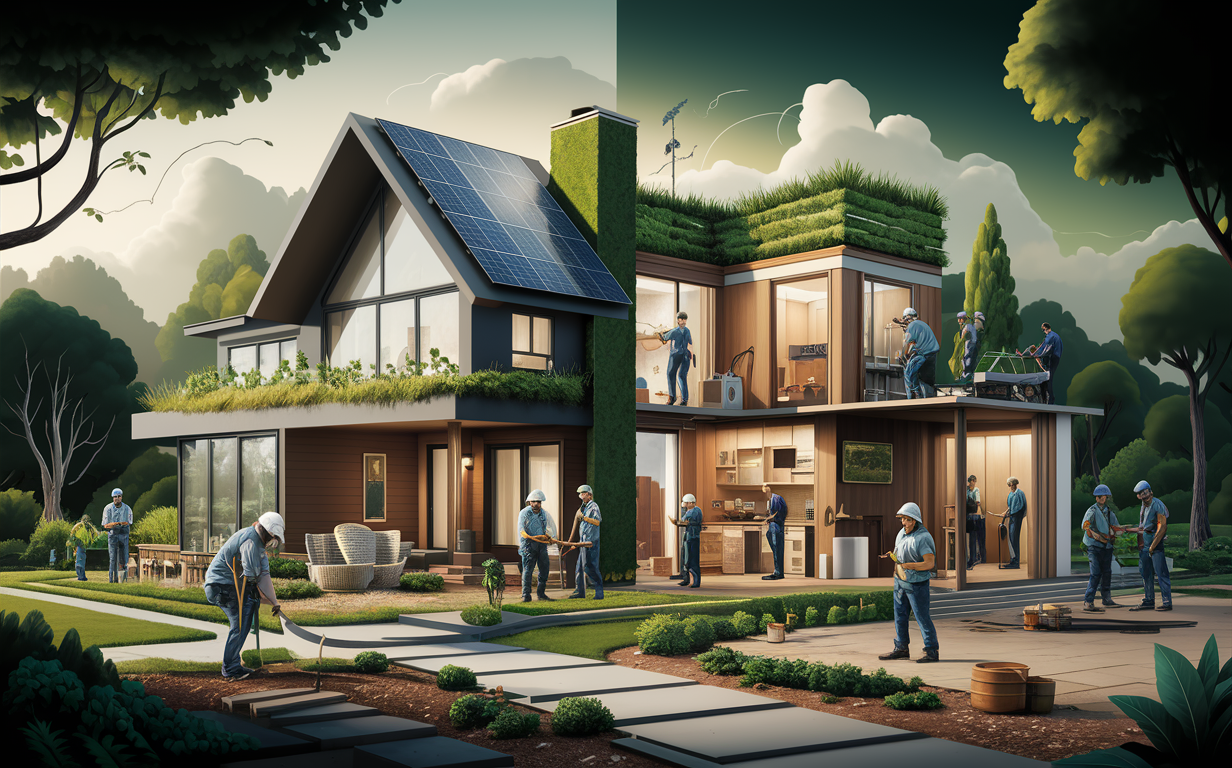 To understand the impact of green renovation solutions, let’s explore some real-life success stories.
To understand the impact of green renovation solutions, let’s explore some real-life success stories.
The Smith Family’s Green Home Transformation
The Smith family decided to renovate their 30-year-old home with a focus on sustainability. They implemented energy-efficient windows, solar panels, and low-flow fixtures. The result? A 40% reduction in energy bills and a 50% decrease in water usage.
Green Office Renovation
A local business in Winnipeg renovated their office space using sustainable materials and energy-efficient systems. They installed LED lighting, low-flow fixtures, and a rainwater harvesting system. This led to significant cost savings and an improved work environment.
Practical Tips for Implementing Green Renovation Solutions
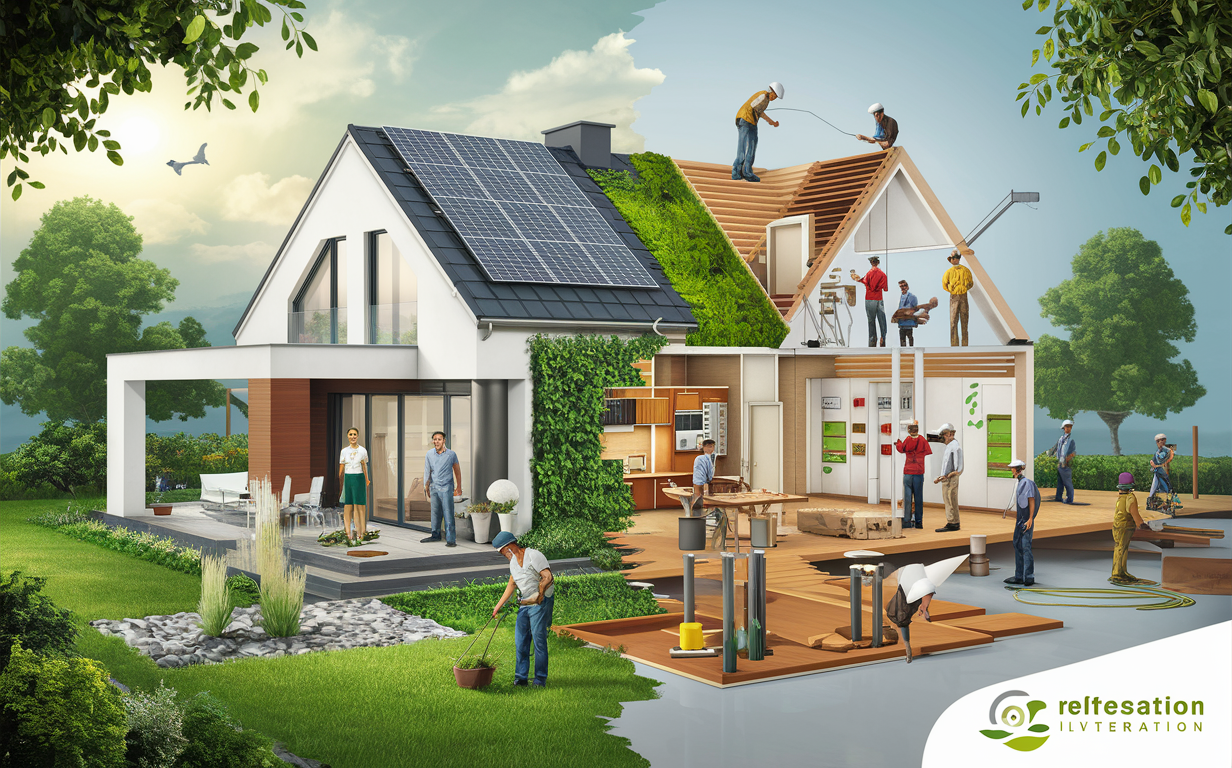 Here are some practical tips to help you implement green renovation solutions in your home.
Here are some practical tips to help you implement green renovation solutions in your home.
Plan Ahead
Planning is crucial for successful green renovations. Assess your home’s current energy and water usage to identify areas for improvement. Create a detailed plan and budget for the renovations.
Choose the Right Materials
Opt for materials that are sustainable and have a low environmental impact. Research suppliers and manufacturers to ensure they adhere to eco-friendly practices.
Hire Experienced Contractors
Work with contractors who have experience in green renovations. They can provide valuable insights and ensure that the renovations are done correctly.
Take Advantage of Incentives
Many governments and organizations offer incentives for green renovations, such as tax credits and rebates. Research available programs in your area to take full advantage of these benefits.
Unique Green Renovation Ideas
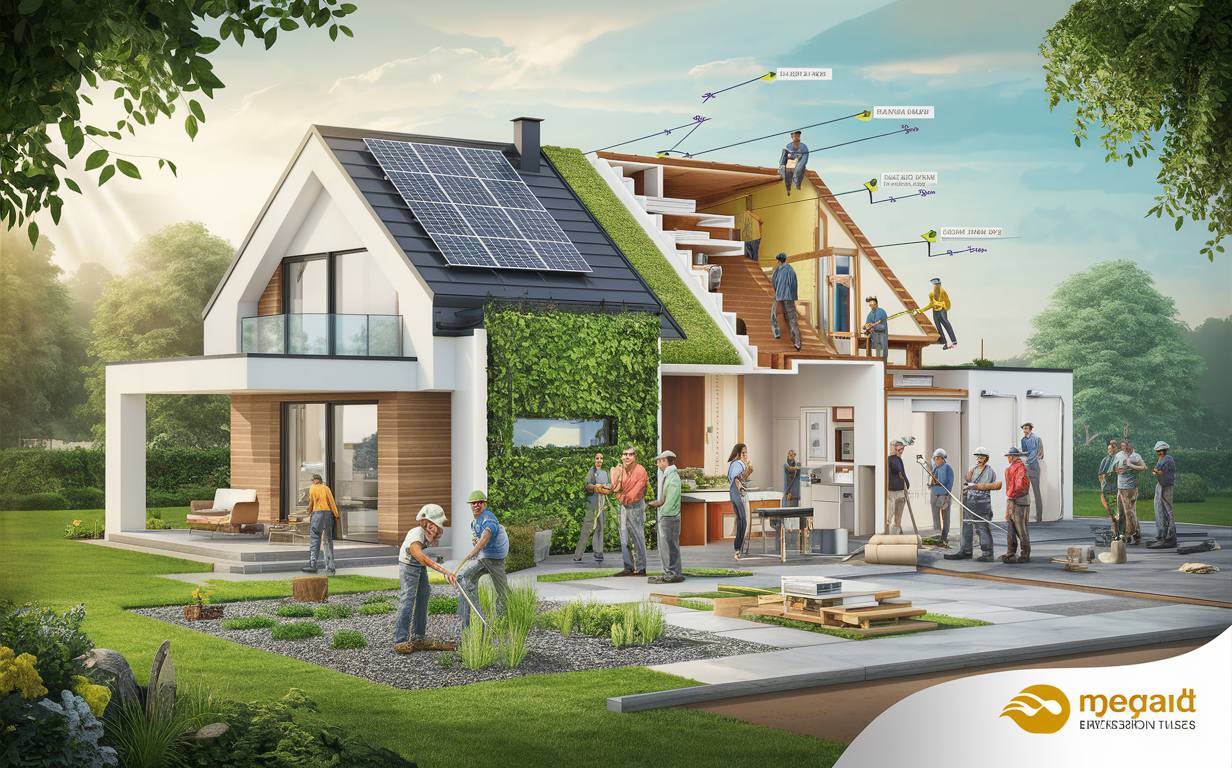 Here are some unique green renovation ideas that you might not have considered.
Here are some unique green renovation ideas that you might not have considered.
Green Roofs
A green roof is covered with vegetation and provides numerous environmental benefits. It improves insulation, reduces stormwater runoff, and enhances air quality.
Passive Solar Design
Passive solar design involves using the sun’s energy for heating and cooling. This can be achieved through proper orientation of windows, thermal mass materials, and shading.
Smart Home Technology
Integrating smart home technology can enhance the efficiency of your green renovations. Smart thermostats, lighting, and irrigation systems can be programmed to optimize energy and water usage.
Understanding the Costs and Savings
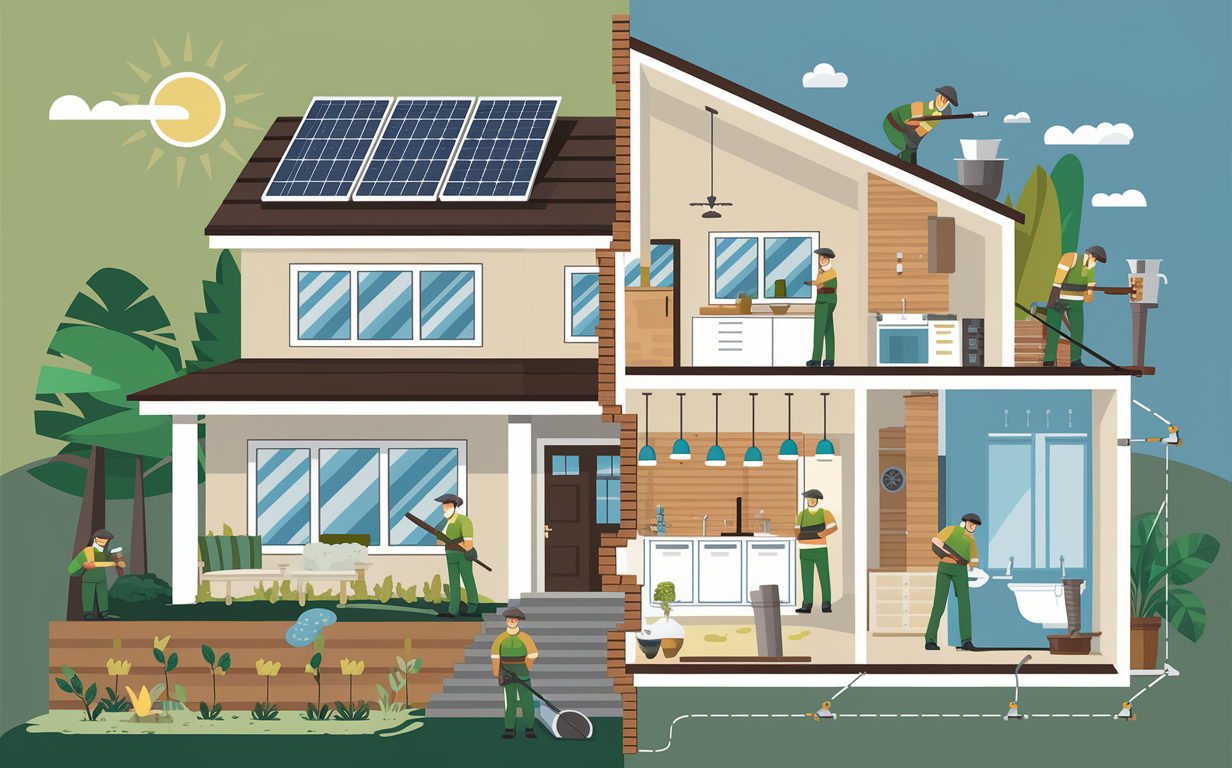 Implementing green renovation solutions may involve upfront costs, but the long-term savings often outweigh the initial investment.
Implementing green renovation solutions may involve upfront costs, but the long-term savings often outweigh the initial investment.
Initial Costs
The initial costs of green renovations can vary depending on the scope of the project and the materials used. However, many sustainable materials and systems are now more affordable.
Long-Term Savings
Green renovations can lead to significant long-term savings in energy and water bills. Additionally, many green upgrades, such as solar panels, often pay for themselves over time.
| Renovation Type | Initial Cost | Annual Savings | Payback Period |
|---|---|---|---|
| Solar Panels | $10,000 | $800 | 12.5 years |
| Energy-Efficient Windows | $5,000 | $200 | 25 years |
| Low-Flow Fixtures | $500 | $150 | 3.3 years |
Increase in Property Value
Green renovations can increase your property’s value. Homes with sustainable features are often more attractive to buyers and can command higher prices.
The Environmental Impact
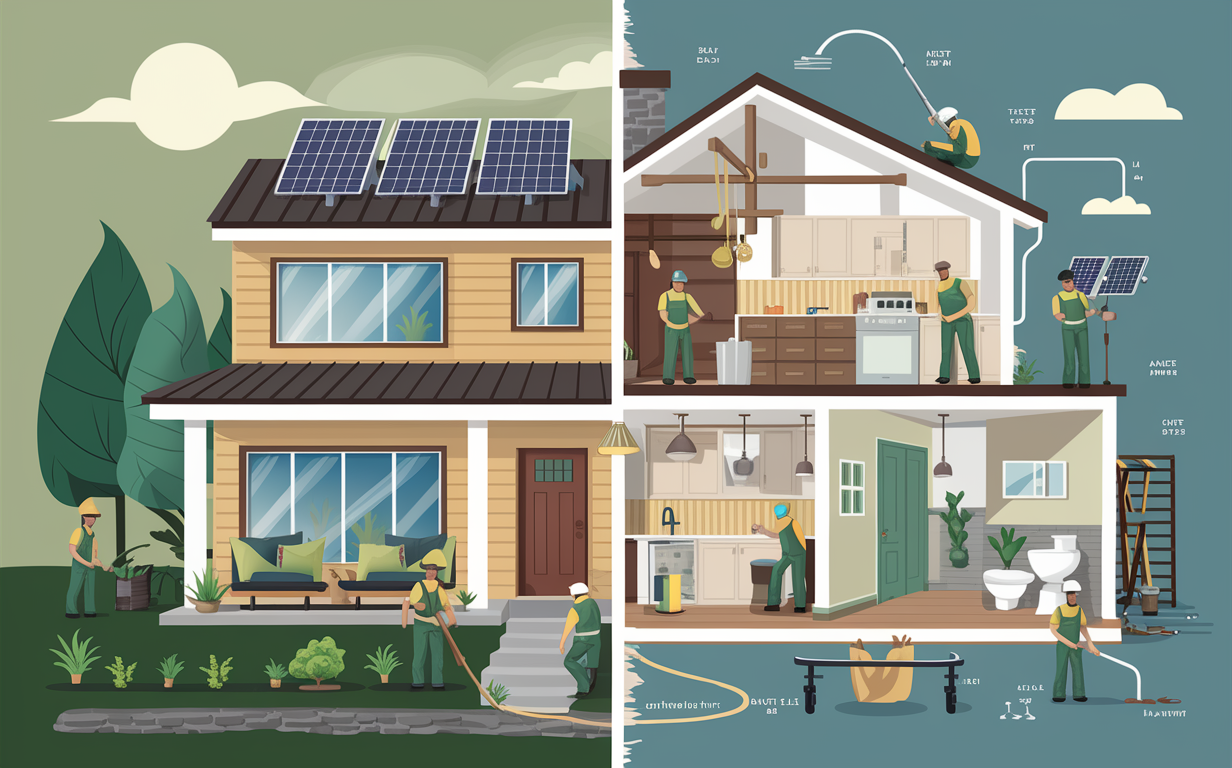 Green renovations have a positive impact on the environment. They reduce energy and water consumption, decrease greenhouse gas emissions, and minimize waste.
Green renovations have a positive impact on the environment. They reduce energy and water consumption, decrease greenhouse gas emissions, and minimize waste.
Reduction in Carbon Footprint
By using energy-efficient systems and renewable energy sources, you can significantly reduce your home’s carbon footprint. This helps combat climate change and promotes a healthier planet.
Conservation of Natural Resources
Sustainable materials and water-saving systems help conserve natural resources. This reduces the demand for new materials and minimizes the impact on ecosystems.
Common Challenges and How to Overcome Them
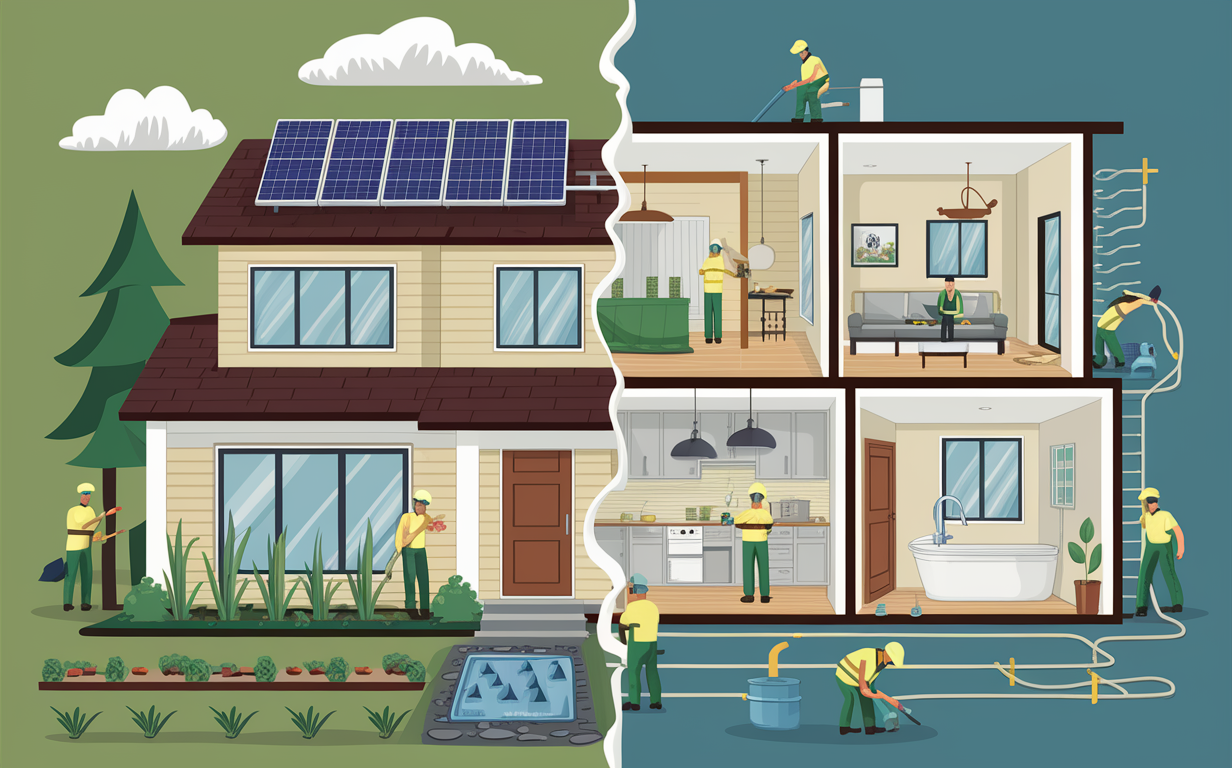 While green renovations offer numerous benefits, they can also present challenges. Here are some common issues and how to address them.
While green renovations offer numerous benefits, they can also present challenges. Here are some common issues and how to address them.
High Initial Costs
The upfront costs of green renovations can be high. However, you can overcome this by taking advantage of incentives, choosing cost-effective materials, and prioritizing upgrades that offer the highest savings.
Limited Availability of Sustainable Materials
Finding sustainable materials can sometimes be challenging. Research suppliers and consider local sources to reduce transportation costs and environmental impact.
Finding Skilled Contractors
Not all contractors have experience with green renovations. Look for professionals with a proven track record in sustainable practices and ask for references.
The Future of Green Renovations
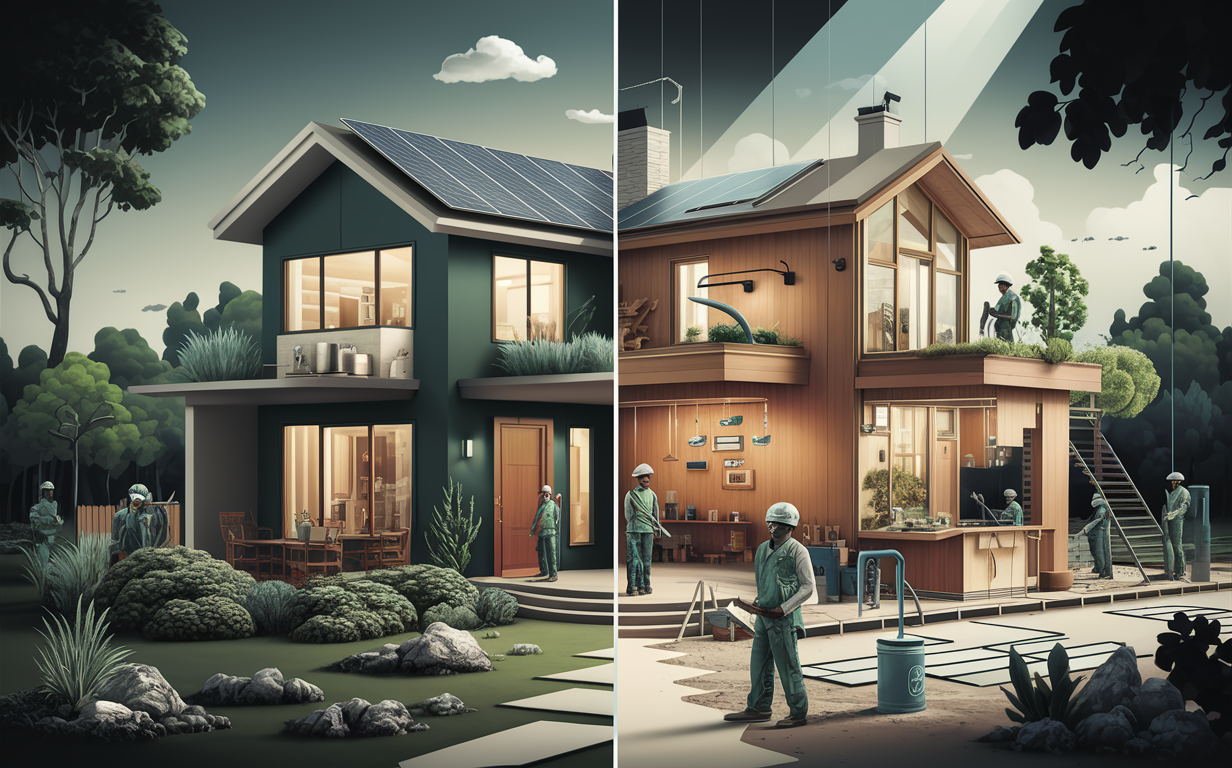 The future of green renovations looks promising. Advancements in technology and growing awareness of environmental issues are driving the demand for sustainable home upgrades.
The future of green renovations looks promising. Advancements in technology and growing awareness of environmental issues are driving the demand for sustainable home upgrades.
Technological Advancements
Innovations in renewable energy, smart home technology, and sustainable materials are making green renovations more accessible and effective.
Growing Awareness
As more people become aware of the environmental and financial benefits of green renovations, the demand for eco-friendly home upgrades is expected to rise.
Government Support
Governments and organizations worldwide are increasingly supporting green renovations through incentives and regulations. This support is likely to continue, making sustainable home upgrades more feasible for homeowners.
Conclusion
Green renovation solutions offer a viable way to create an eco-friendly home. By focusing on energy efficiency, water conservation, and sustainable materials, you can reduce your environmental impact, save on utility bills, and enhance your home’s value. With careful planning and the right approach, you can transform your home into a sustainable and beautiful living space.
Choosing to implement green renovation solutions is not just an investment in your home but also in the planet’s future. Start your green renovation journey today and contribute to a healthier, more sustainable world.
